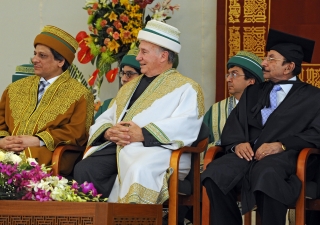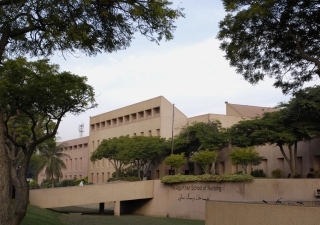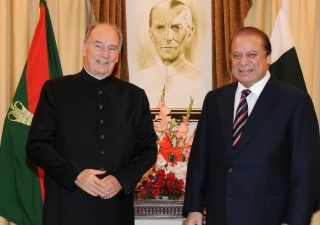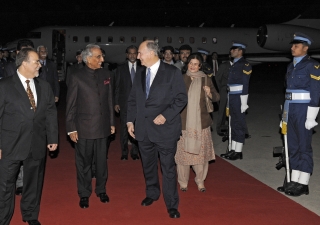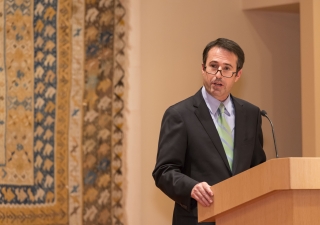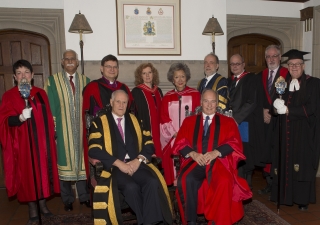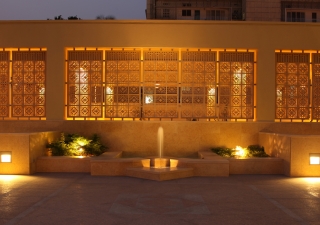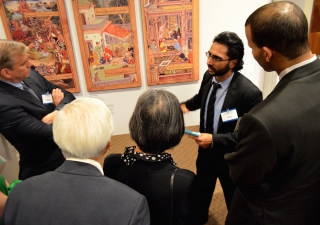News
Karachi, 19 December 2013 – Mawlana Hazar Imam set out a bold vision for the Aga Khan University, an ambitious challenge that will see it evolve into “a distinguished liberal arts university” over the next few decades. Presiding over the 26th Convocation of the University, Hazar Imam also announced the creation of seven graduate schools.
Three decades is a relatively short period in the history of a university, but the impact that the Aga Khan University has had in its formative years is not to be underestimated. And while the institution may be young, its spirit is far older.
Islamabad, 16 December 2013 – In separate meetings with the President, the Prime Minister, the Advisor to the Prime Minister on National Security and Foreign Affairs and the Finance Minister of Pakistan, Mawlana Hazar Imam received praise for the leadership role taken by the AKDN in the country’s development, and for its effectiveness in improving the quality of life of those whom it reaches.
The webcast is scheduled to take place on 19 December 2013, starting at 10:30 AM PKT (Karachi time) and can be viewed on this page.
Islamabad, 15 December 2013 – Mawlana Hazar Imam arrived in Islamabad this evening, commencing an official visit to Pakistan. During the visit, Hazar Imam will meet with government officials, attend to AKDN related matters and preside over a convocation of the Aga Khan University.
John Stackhouse, Editor-in-chief of the Globe and Mail, delivered the Ismaili Centre Lecture on 1 December 2013, in which he described pluralism as being central to Canadian identity. An annual event featuring speakers of distinction, the lecture took place at the Ismaili Centre, Burnaby, part of a growing network of such centres whose role is to encourage exchange, mutual understanding and friendship between peoples of diverse communities and faiths.
Ottawa, 27 November 2013 – In a ceremony held at the Delegation of the Ismaili Imamat, Mawlana Hazar Imam was lauded by the Royal Architectural Institute of Canada, who presented the Imam with their highest honour – the 2013 Gold Medal. In his remarks, Hazar Imam expressed his gratitude and went on to describe the connection between architecture and quality of life, explaining how the Ismaili Centres embodied for the Jamat the hopeful aspirations of a forward looking community.
In a ceremony held at the Delegation of the Ismaili Imamat in Ottawa, Mawlana Hazar Imam was lauded by the Royal Architectural Institute of Canada, who presented the Imam with their highest honour – the 2013 Gold Medal. In his remarks, Hazar Imam expressed his gratitude and went on to describe the connection between architecture and quality of life, explaining how the Ismaili Centres embodied for the Jamat the hopeful aspirations of a forward looking community.
As the Royal Architectural Institute of Canada honours Mawlana Hazar Imam with their Gold Medal, Mehnaz Thawer explores how the Imam has demonstrated that architecture can extend beyond the structural, the functional and the aesthetic. It can give shape to cultural values, traditions, aspirations, and be a bedrock for sustainable development.
Toronto, 25 November 2013 – The University of Toronto’s Trinity College held a special convocation this evening, to bestow upon Mawlana Hazar Imam the degree of Doctor of Sacred Letters, honoris causa. In a glowing citation, the Right Honourable Adrienne Clarkson, presented Hazar Imam before the Chancellor of Trinity College.
The Ismaili Jamatkhana and Centre, Kinshasa is a contemporary complex that blends timeless traditional design principles. It provides an environment for spiritual contemplation and reflection, and represents a new milestone in the long history of the Congolese Jamat, which continues to build on its pioneering spirit in a country of growing opportunity.
Scheduled to open in Toronto in the summer of 2014, the Aga Khan Museum has embarked on a tour to introduce itself in major American centres. As the first museum in North America dedicated to the Islamic Arts, it is using the opportunity to demonstrate that despite being separated by centuries of history, ancient works and the knowledge they carry within them, remain relevant to us today.

